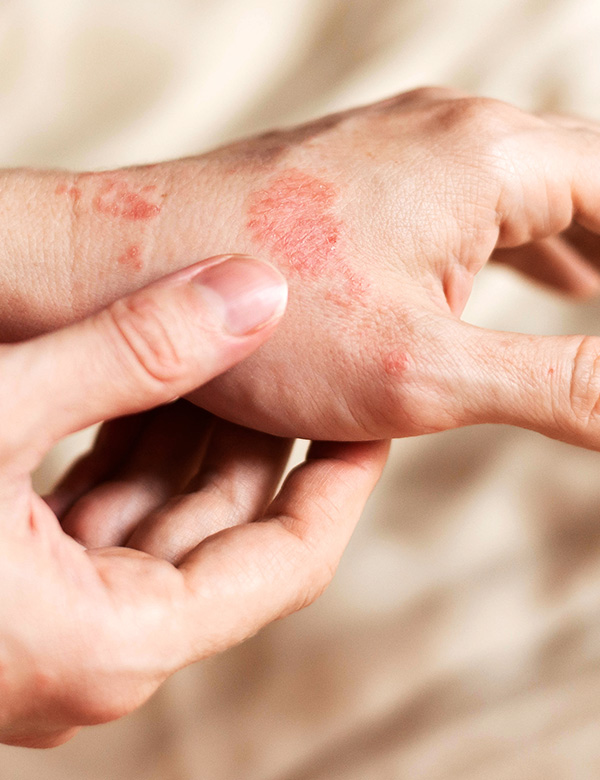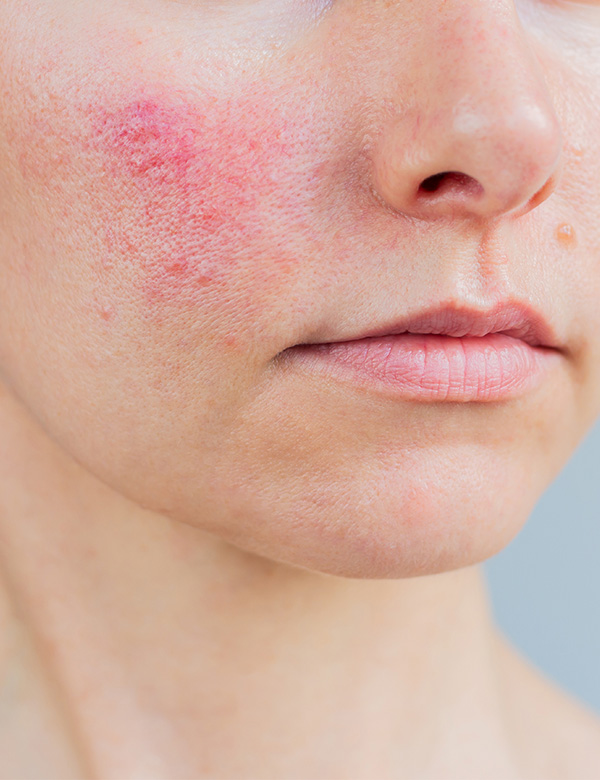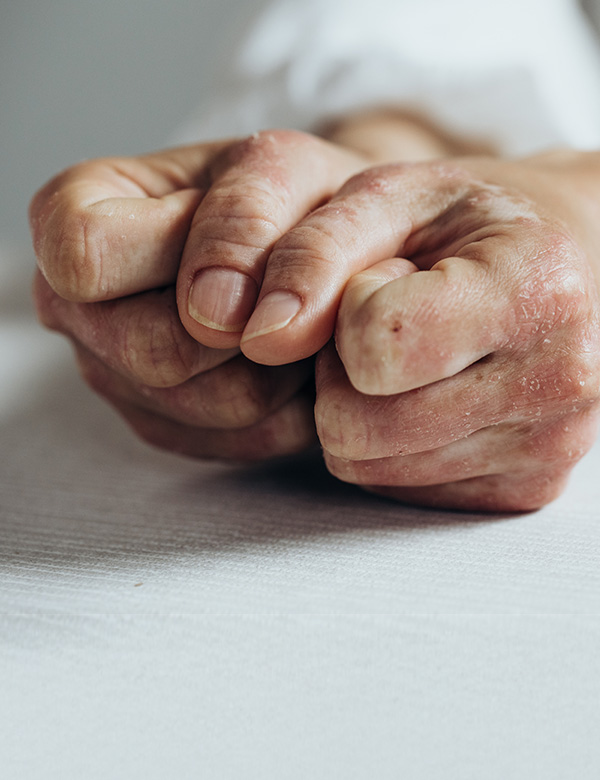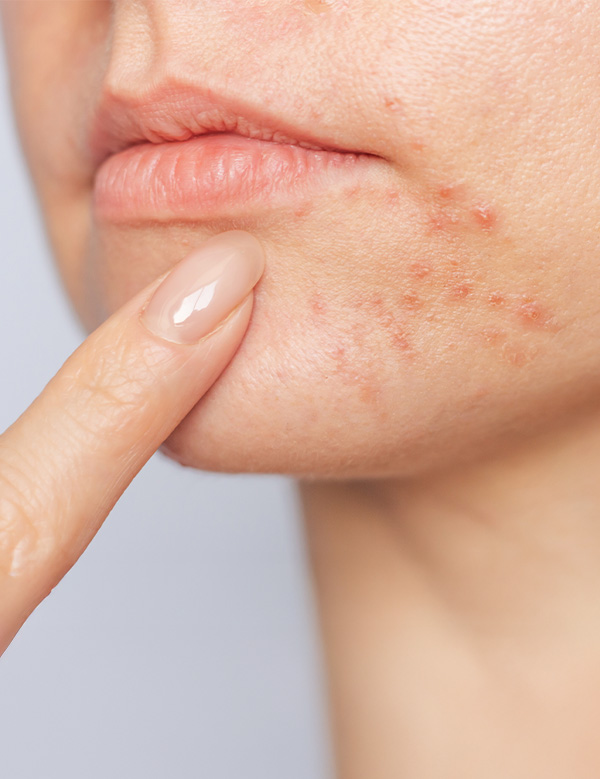Genetic & Sudden Hair Loss
Excessive hair loss, thinning or sparse hair in adults and children—get it checked and treated by an experienced dermatologist at Derma Medical Clinic in Zurich - Sihlcity.
Genetic & Sudden Hair Loss
Chronische Abszesse und schmerzhafte Knoten durch erfahrenen Hautarzt abklären und behandeln in der Derma Medical Clinic in Zürich - Sihlcity
Increased hair loss due to stress, infections, hormonal changes, or for no clear reason — in our specialized hair consultation, we assess whether it’s sudden hair loss or a genetic form, and which treatments may suit your situation.
Examinations
Scalp examination
Hair analysis
Blood test
Process
First appointment, examination and consultation
If needed: months of follow-up treatment support
Duration
between 20 and 30 minutes
We usually distinguish between two common types of hair loss:
Sudden hair loss (medically called “effluvium”): Hair thins all over, with even and sudden shedding across the entire scalp.
Common triggers include stress, infections, medications, hormonal changes (e.g., pregnancy), or nutrient deficiency.
This type is usually temporary.
Genetic hair loss (medically called “androgenetic alopecia”): Hair gradually thins in certain patterns over months or years.
It’s caused by a hereditary predisposition, where hair roots react sensitively to certain hormones.
We recommend evaluation if you …
- suddenly experience noticeable hair shedding, for example while showering, brushing or noticing it on your pillow
- notice your hair thinning overall or losing its fullness
- see bare or thinning spots on the crown or parting (common with genetic hair loss)
- are bothered by receding hairline or thinning temples
- notice hair loss after an infection, childbirth or hormonal change
- wonder if your hair loss is temporary or caused by an inherited condition

We usually distinguish between two common types of hair loss:
Sudden hair loss (medically called “effluvium”): Hair thins all over, with even and sudden shedding across the entire scalp.
Common triggers include stress, infections, medications, hormonal changes (e.g., pregnancy), or nutrient deficiency.
This type is usually temporary.
Genetic hair loss (medically called “androgenetic alopecia”): Hair gradually thins in certain patterns over months or years.
It’s caused by a hereditary predisposition, where hair roots react sensitively to certain hormones.
Who should consider evaluation for hair loss?
We recommend evaluation if you …
- suddenly experience noticeable hair shedding, for example while showering, brushing or noticing it on your pillow
- notice your hair thinning overall or losing its fullness
- see bare or thinning spots on the crown or parting (common with genetic hair loss)
- are bothered by receding hairline or thinning temples
- notice hair loss after an infection, childbirth or hormonal change
- wonder if your hair loss is temporary or caused by an inherited condition
Treatment
We begin with a scalp examination. If needed, we add a hair and root analysis or a blood test. A blood test helps determine whether nutrient deficiencies or hormone imbalances could be affecting your hair.
What treatment options are available for hair loss?
For sudden-onset hair loss (effluvium), we focus on the following:
If test results show missing nutrients or hormonal imbalance, we may recommend supplements or hormonal support in cooperation with your general practitioner or gynecologist.
If the hair loss is stress-related, sometimes rest and relief are already helpful. For genetic hair loss (androgenetic alopecia), topical solutions that are applied to the scalp are often used.
Certain medications—for example in tablet form—can also be appropriate, provided there are no medical reasons against it.
We’ll decide together which treatment best suits you, and we’ll guide you step by step. Platelet-Rich Plasma (autologous blood treatment) can be helpful in both cases:
Here, components of your own blood are injected into the scalp.
Important: Not all hair loss requires immediate treatment. Sometimes it’s enough to know there’s no serious cause.
We support you with an honest assessment, modern methods, and plenty of experience with all types of hair loss.
What does a hair loss evaluation involve?
Initial consultation
During your first visit, we’ll talk about the course of your hair loss, family history, and possible triggers.
Scalp examination
We carefully assess the affected areas, using camera-based imaging if needed to analyze hair density and structure.
Treatment recommendation
We’ll discuss treatment options with you and explain which ones are realistic and make sense for your situation.
Follow-ups
In follow-up visits, we check how your scalp is responding, adjust the treatment if necessary, and continue supporting you.

Hair loss evaluation and treatment at Derma Medical Clinic is carried out by Dr. Markus Dendorfer, a specialist in dermatology.
He has many years of experience in diagnosing and treating hair conditions in women, men, and children.

Dr. med. Benjamin Miller
Board-certified Specialist in Dermatology & Venereology FMH

Dr. med. Markus Dendorfer
Board-certified Specialist in Dermatology & Venereology FMH
What makes Derma Medical Clinic special
Specialized hair consultation
Our hair condition specialist has many years of experience diagnosing different types of hair loss in women, men, and children.
Child-friendly diagnostics & support
We take a gentle and age-appropriate approach with children, guiding families with empathy and clear explanations.
Hair analysis
We rely not only on trained observation but also on objective technology: a computer-based method measures hair density, thickness, and growth behavior in a small scalp area.
All in one place
You’ll receive diagnosis, medical treatment, and cosmetic support in one location. That means one team, short paths, and coordinated care—from the first visit to follow-up.
Have you noticed your hair getting thinner at the front or crown area and wonder why?
Book your appointment now for a thorough evaluation at the hair consultation of Derma Medical Clinic in Zurich - Sihlcity.
FAQ – Common Questions About Hair Loss
What’s the difference between sudden hair loss and genetic hair loss?
Sudden hair loss (effluvium) affects the entire scalp evenly, for example after stress, infections, or hormonal changes. Genetic hair loss (androgenetic alopecia) progresses slowly and often starts at the part, crown, or temples.
How can I tell which type of hair loss I have?
Sudden hair loss often shows up as more hair on your pillow, in your brush, or during washing. Genetic hair loss tends to appear as thinning at the part or a receding hairline. A dermatological evaluation provides clarity.
What causes sudden, increased hair loss?
Physical or emotional stress, infections with fever, surgeries, iron deficiency, hormonal changes, or medications. The hair loss often begins 2–3 months after the trigger.
What role does stress play in hair loss?
Stress is one of the most common triggers for sudden hair loss. It can disrupt the hair cycle and lead to shedding, even if there’s no physical illness. Reducing stress is key in such cases.
What is androgenetic alopecia?
This is the medical term for hereditary hair loss. The hair roots are sensitive to the hormone DHT, which shortens the growth phase. It usually shows up as thinning hair on the crown or a receding hairline.
Is hair loss after pregnancy normal?
Yes, hormonal changes can cause temporary effluvium.
Hair loss typically starts 2–3 months after giving birth and often resolves on its own.
Which blood values are relevant for hair loss?
Depending on the case, we may check levels like iron, ferritin, thyroid hormones, vitamin D, zinc, or other specific hormones to detect deficiencies that may affect hair growth.
How does autologous blood therapy help with hair loss?
Autologous blood therapy uses components of your own blood that are injected into the scalp. It can support hair roots and may complement other treatments. We’ll discuss individually if it’s suitable for you.
Do hairs grow back after effluvium?
In many cases, yes.
Once the cause is identified and addressed, hair growth can return to normal. Patience is key—first results may be visible after a few weeks or months.
Can genetic hair loss be stopped?
It can’t be fully stopped, but treatments can slow down the progression.
When should I see a dermatologist for hair loss?
If you’re unsure whether the hair loss is normal, if it appears suddenly, changes noticeably, or affects you emotionally—having it checked by a dermatologist is a good idea.
Is hair loss different in women compared to men?
Yes, in women genetic hair loss often appears as thinning at the part, while men may have receding temples or bald spots on the crown. Hormonal changes (like menopause) also play a bigger role in women.




